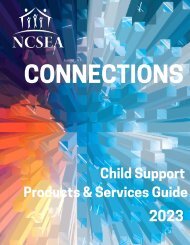April 2024 CSQ
You also want an ePaper? Increase the reach of your titles
YUMPU automatically turns print PDFs into web optimized ePapers that Google loves.
in intergovernmental cases on behalf of another Tribe, state, or country.<br />
With 53 percent of Native American children in Tribal areas with programs<br />
living in single-parent families, there is a compelling need for Tribal child<br />
support programs.<br />
Yet there are only 61 Tribes currently<br />
operating a child support program, a small<br />
percentage of the 574 federally recognized<br />
Tribes in the United States. The main<br />
barrier to greater participation is the 80-20<br />
and 90-10 cost sharing rates between<br />
Tribes and federal government. Because<br />
Tribal governments have fewer revenue-generating options than state<br />
governments, the match often requires Tribes to choose between allocating<br />
scarce resources to provide critical services, or develop and operate a child<br />
support program. OCSS issued an NPRM on <strong>April</strong> 21, 2023, to address this<br />
problem and NCSEA filed comments in support of eliminating cost sharing<br />
entirely.<br />
On February 12, <strong>2024</strong>, OCSS<br />
announced a final rule that<br />
eliminated the burdensome cost<br />
sharing requirement for Tribal child<br />
support programs. See 89 Fed.<br />
Reg. 9784, Elimination of the Tribal<br />
Non-Federal Share Requirement.<br />
The change will take effect later this<br />
year on October 1, <strong>2024</strong>.<br />
As explained by Health and Human<br />
Services Secretary Xavier Becerra, the change will “make it easier and less<br />
expensive for Tribal community-run child support programs to meet the<br />
needs of their communities.” OCSS Commissioner Tanguler Gray praised<br />
the final rule stating: “We’ve heard their feedback loud and clear, and are<br />
doing what we can to remove unnecessary burdens to operating their own<br />
programs. This rule does just that, and will make it easier for existing and<br />
new Tribal child support programs to access funding they need to improve<br />
outcomes for children and families.”<br />
The final rule also was intended to promote equity and aims to honor Tribal<br />
sovereignty. To further the survival and welfare of Indian Tribes and people,<br />
the final rule reiterates the federal commitment to provide services needed















